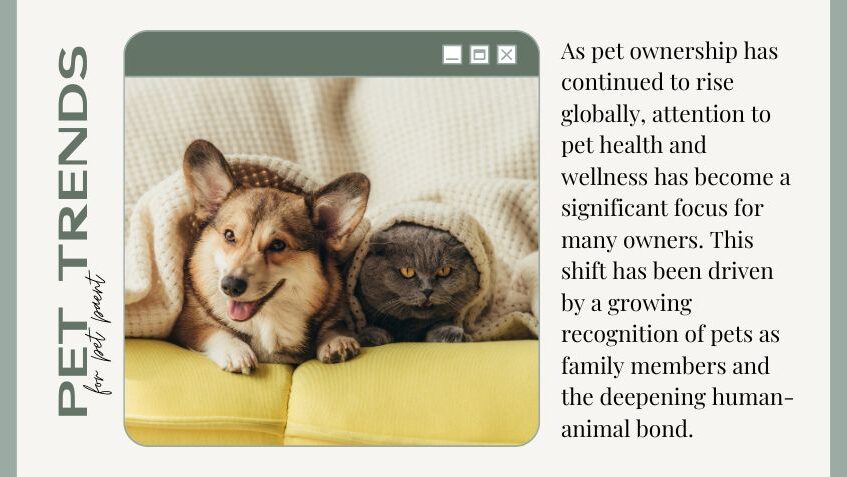Global Trends in Pet Health – What you need to know!
As pet ownership has continued to rise globally, attention to pet health and wellness has become a significant focus for many owners. This shift has been driven by a growing recognition of pets as family members and the deepening human-animal bond. Here are some key trends in pet health that you need to know:
- Humanization and Premiumization of Pet Care
Pets are increasingly treated as family members, which has led to a rise in the demand for premium pet products and services. This includes high-quality, organic, or specialty diets, health supplements, and advanced veterinary care options such as regenerative medicine and minimally invasive surgeries.
- Technological Advancements in Veterinary Care
Technology plays a crucial role in advancing pet health care. Innovations include telemedicine, which has become more prevalent especially following the COVID-19 pandemic, allowing pet owners to consult veterinarians remotely. Other advancements include wearable tech that monitors pet activity and health, and AI-driven diagnostics tools that help in early detection of diseases.
- Rise in Pet Insurance
As veterinary care becomes more sophisticated and expensive, there has been a corresponding rise in pet insurance to help mitigate these costs. More pet owners are opting for insurance to cover unexpected health issues and routine care, which can be a smart investment given the rising costs of veterinary services.
- Focus on Mental Health and Behavioral Therapy
There is an increasing awareness of the mental health of pets. Behavioral disorders are being more widely recognized and treated with both medical and non-medical interventions, including training, therapy, and even medications. This trend reflects a broader understanding of the importance of mental health alongside physical health.
- Integrated Health Approaches
Holistic and integrative veterinary practices are gaining traction. These may include acupuncture, chiropractic care, herbal remedies, and other complementary therapies alongside traditional veterinary medicine. These approaches often focus on prevention and enhancing the quality of life of pets.
- Nutritional Innovations
Pet nutrition has seen significant innovations, including diets formulated for specific breeds, life stages, or health conditions. Customized meal plans and subscription food services that offer tailored diets for individual pets based on their specific needs are becoming popular.
- Sustainability in Pet Products
Sustainability is becoming a priority for pet owners when choosing products. This includes sustainably sourced pet foods, eco-friendly toys, and biodegradable waste products. Companies are increasingly highlighting their commitment to sustainability as a selling point.
- Expansion of One Health
The “One Health” concept, which links the health of humans, animals, and the environment, is influencing pet health trends. This approach promotes a comprehensive strategy to prevent health issues that can spread between pets and humans or have a broader environmental impact.
- Genetic Health Screening
With the decrease in the costs of genetic testing, more pet owners are opting for these tests to uncover potential health risks and understand their pets’ genetic predispositions. This can lead to early interventions and personalized health plans.
- Global Market Variations
It’s important to note that these trends can vary significantly across different regions. Factors such as economic conditions, cultural attitudes towards pets, and local regulations all influence how pet health trends develop globally.
Overall, the global focus on pet health is becoming more sophisticated, mirroring many aspects of human healthcare trends. Pet owners and industry professionals alike are increasingly informed about and invested in extending and improving the quality of life for pets.
You may also visit – https://www.facebook.com/angkopparasahayop





